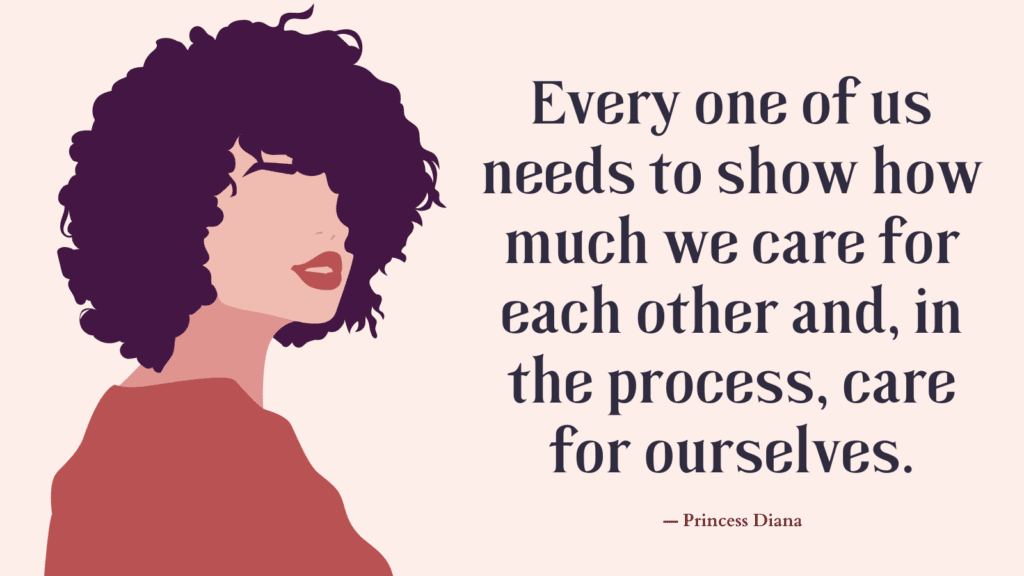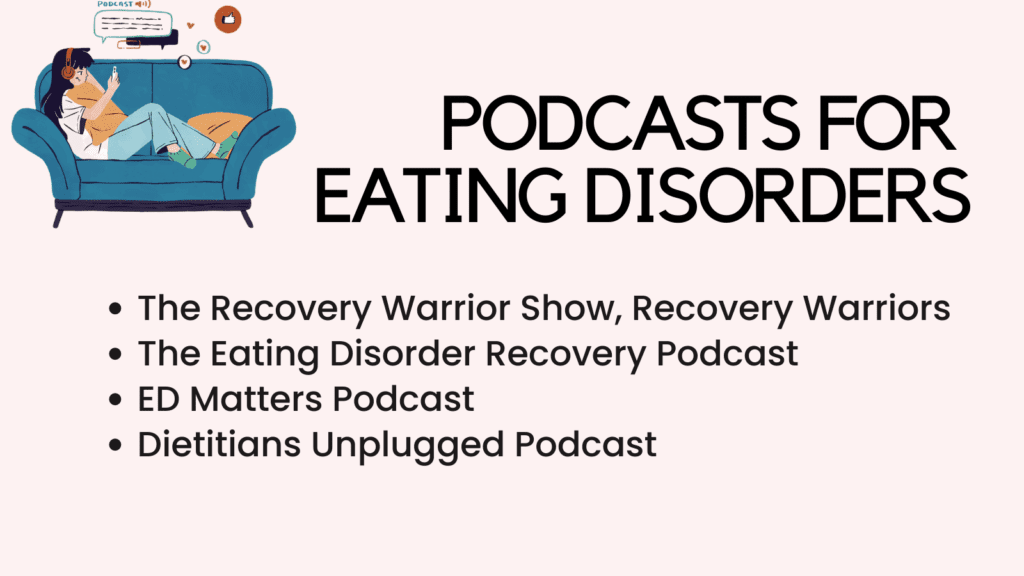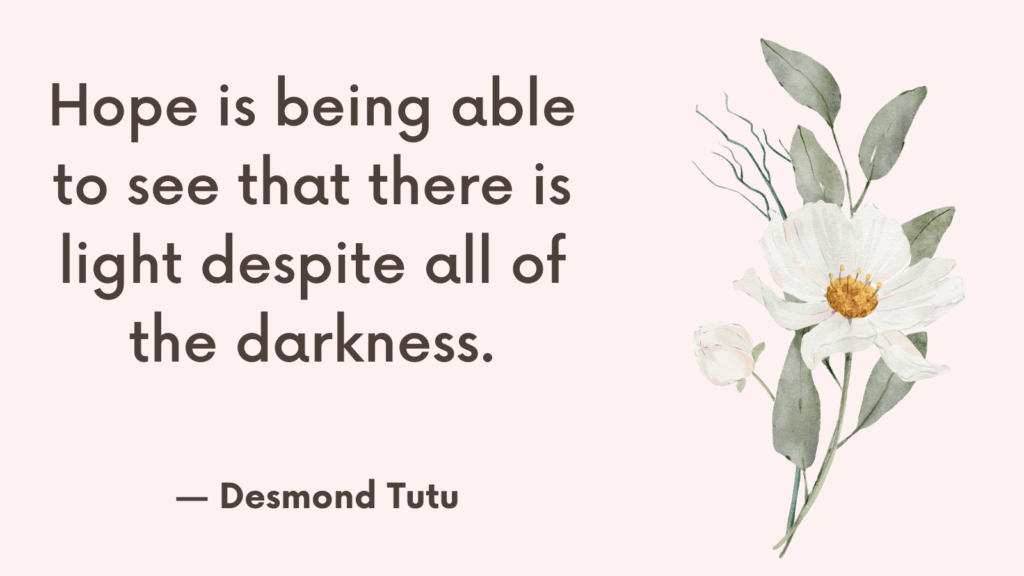Today, you’re going to learn how to help a partner with an eating disorder: what not to say to someone with an eating disorder and what to do instead.
Eating disorders wreak havoc on relationships.
Food is a central aspect of every couple’s daily life. We not only have to eat, but we use eating to socialize, to celebrate, and to comfort.
This makes eating disorder an inevitable part of your everyday life as a couple – as you recover from one difficult moment, the next is upon you.
But it’s not just food that you need to avoid talking about. Messages about body image, grocery shopping, cooking, clothes, etc. are additional minefields to navigate.
An eating disorder doesn’t just affect your partner, it also affects your relationship, the intimacy, and can be a financial strain in some cases.
- How Do You Know If Your Partner Has An Eating Disorder?
- What Not To Say To Someone With An Eating Disorder? 6 Common Communication Mistakes to Avoid
- How Much Your Partner’s Eating Disorder Is Affecting You?
- How To Support A Partner With An Eating Disorder?
- Get Feedback from Your Partner
- What If Your Partner Denies That They Have A Problem?
How Do You Know If Your Partner Has An Eating Disorder?
Eating disorders are sometimes easier to recognize in someone else than in oneself. Individuals with eating disorders can develop rules and ideas about food that are all-or-nothing and extreme.
While dietary changes and weight loss do not indicate the presence of an eating disorder, unusual and frequent eating behaviors can cause significant trouble.
An evaluation is appropriate in the following cases:
* Dramatic change in the foods eaten,
* No longer eating favorite foods or following strict food rules,
* Eating in patterns that appear unusual—consuming large amounts of food followed by frequent trips to the bathroom, for example.
* Their social life is changing because of the suffering experienced around eating (avoiding meals in social settings including in front of family, eating in one’s room, etc)
Related: What Triggers Eating Disorder Relapse? (Top 3 Triggers)
What Not To Say To Someone With An Eating Disorder? 6 Common Communication Mistakes to Avoid
#1. Commenting on Weight, Appearance, or Food Choices
Many people believe that if they could convince their loved one that they are beautiful enough or skinny enough, their eating disorder will go away.
Unfortunately, this has the opposite effect of what was intended!
Commenting that your partner is beautiful, might make them even more determined to lose more weight and look even prettier, or maintain their looks.
Eating disorder feeds on attention. Any time you are focused on weight or appearance, even in a positive way, the eating disorder intensifies.
What to Do Instead?
It’s better to avoid these comments completely.
Instead, focus on your partner’s inner self and their personality traits. Let them know that these are more important and compliment them for these traits.
These could include being smart, funny, kind, assertive, determined at work, etc.
What if they ask you if what they’re wearing is making them look fat?
You can ask if they’re comfortable in their outfit, or ask if they’re feeling upset or anxious and how you can help if that’s the case.
#2. Comparing Their Body With Your Own Or Someone Else’s Body
Some people believe that if they could show their partner how they’re smaller than most people, the eating disorder will go away.
However, that probably will increase their partner’s concerns about becoming fat like these people.
What to Do Instead?
The same rule applies here. Avoid comment about appearances, weight, or food behaviors.
#3. Being a Food Cop
Asking your partner repeatedly what they have eaten and tracking their weight, usually makes them tempted to just lie and hide their food behaviors.
This is mainly because people with eating disorders feel like they can’t change, but they also don’t want to upset other people.
What to Do Instead?
Show your understanding and offer support by saying something like, “I understand that it’s a food choice you make when you’re stressed. If you’re having a hard time, I’m here for you.”
#4. Taking It Personally and Guilt-Tripping
Some people believe that they failed to love or communicate their love enough to their loved one.
This makes their loved one feel guilty and helpless as they don’t feel like they can change their eating disorder.
What to Do Instead?
The truth is you cannot fix your partner and it’s not your fault that they use their eating disorder to numb their feelings after an argument, for example.
Conflict is a normal part of every relationship. The fact that your partner would use eating disorder to cope with their difficult emotion, because they have trouble knowing what else to do with them, isn’t your fault.
You can still offer to talk about what triggered their eating disorder and offer your support.
Read More: The Art of Validation: How to Comfort and Support Someone Without Giving Advice?
#5. Pretending It Doesn’t Affect You
While being a food cop doesn’t help, not talking about it at all, doesn’t help either.
The eating disorder isn’t about you, but it’s affecting you.
The key here is to find a healthy balance, where you don’t take ownership of your partner’s eating disorder, but you do express how it affects you and the relationship.
What to Do Instead?
Speak up when the eating disorder is affecting you.
It is not okay for your partner to leave a mess after purging, or to take food without replacing it.
Express your concern when you feel worried about your loved one.
You can say something like, “I feel worried when I see you skipping meals. I’m concerned about your health.”
#6. Oversimplifying or Making Light of It
In an attempt to ease the emotional tension, some people might say something like, “I wish I could get that and get fit,” Or, “Well, you just have to stop binging.”
Making light of their eating disorder or oversimplifying it can make your partner like you don’t understand their depth of his struggle or how painful it is.
What to Do Instead?
Show your understanding and support. You can say something like, “I understand how hard it is for you to stop doing what you’re doing, and I am here to support you.”
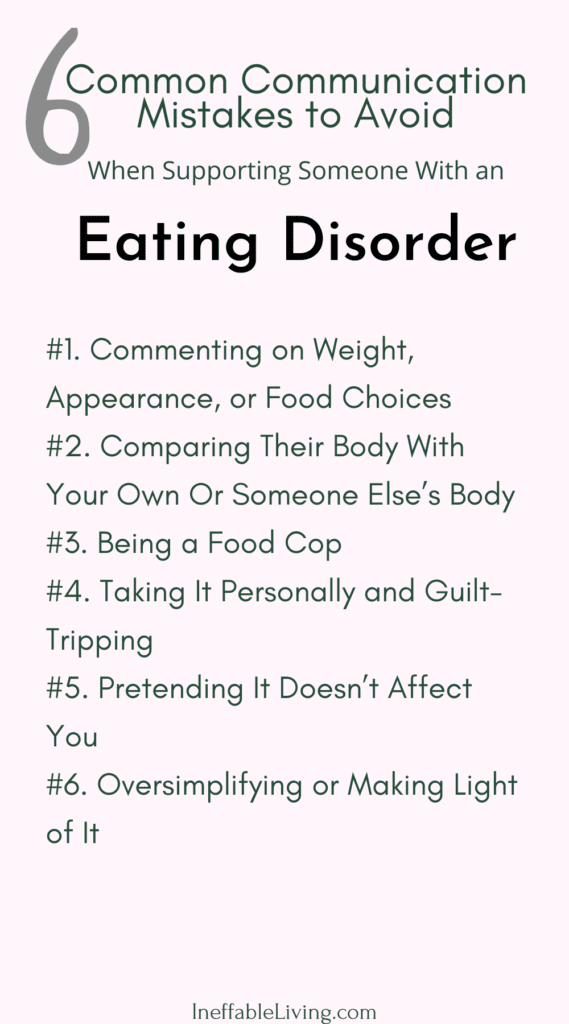
Where do you get support for your partner’s eating disorder?
If and when you become concerned that your eating behaviors might include unhealthy patterns, you may ask your primary care provider whether an eating disorder is present.
You can also seek evaluation by an eating disorder specialist.
To find an eating disorder specialist in your local area, you can ask your current healthcare provider or your insurance company, or consult national professional organizations with referral resources, including those available through the National Eating Disorders Association (NEDA) and Academy for Eating Disorders (AED).
The evaluation process may vary for different individuals, but there will be usually questions about thoughts and feelings about food, weight, and body shape.
Individuals undergoing an evaluation may be asked to a questionnaire, such as the Eating Attitudes Test (EAT-26) or the Eating Disorders Assessment for DSM-5 eating disorders (EDA-5).
There should be also discussions about eating behavior, weight history, family history of eating and eating disorders, and past and current menstrual functioning for girls and women.
Clinicians may also look for physical signs of an eating disorder such as:
- body-checking (i.e., a pattern of touching, pinching, or measuring body parts, including one’s wrists, ribs, hip bone, etc.),
- visible dental erosion, or
- calluses on the back of the hand resulting from repeatedly using it to self-induce vomiting.
To provide more information about the existence of eating disorder and how seriously it has affected the body, other tests could take place such as:
- a physical exam (with attention to vital signs such as heart rate, blood pressure, and temperature),
- an electrocardiogram, and
- blood tests (with attention to serum electrolytes such as sodium and potassium) and blood cell counts.
How Much Your Partner’s Eating Disorder Is Affecting You?
The following statements are some indications that an eating disorder is affecting you:
- You dread mealtimes, meals out, groceries, or cooking
- You worry about your partner’s behavior a great deal of the time
- You argue over food
- You go out of your way to ensure that certain food is or is not in the house
- You hide food or your own eating behaviors
- You feel unappreciated, or resentful around food situations
- You avoid intimacy because it triggers your partner’s body shame
- You feel frustrated when your attempts to “help” fail
How To Support A Partner With An Eating Disorder?
1. Take Care of Yourself First
You can’t pour from an empty cup.
If you are tired, stressed, or overwhelmed, whether because of ED or not, it will affect your ability to provide support to your partner.
#1. Seek Support for Yourself First
Living with someone with an eating disorder can be an isolating experience.
Your romantic partner isn’t likely to be your go-to person in this and if you are not supported yourself, you likely won’t be able to support your partner either.
Seek out the support of your friends and family, or your own therapist.
Related: 45 Easy Self Care Day Ideas at Home for a Healthy Mind, Body & Soul

#2. Reflect On Your Relationship
Before committing yourself to help your partner recover, reflect on the following questions:
* What are your nonnegotiable requirements for a relationship?
(Some examples might include respect, honesty, openness, emotional intimacy, physical attraction, intellectual stimulation, etc.)
* Are these nonnegotiable requirements being met? If not, can this change, and what is required to make that change?
* What personality characteristics and attributes do you love most about your partner and what are the most difficult ones?
* What areas are most affected by the eating disorder?
* How do you imagine your relationship would be like without the eating disorder?
* What issues would still be there if the eating disorder would go away?
* How likely it is that your partner will enter a sustainable recovery? Are they willing to seek professional help?
Reflecting on your relationship will give you a better idea about how to move forward.
#3. Educate Yourself More on Eating Disorders
Learning about eating disorders will help you understand your partner and their struggles better and correct any misconceptions you might have about eating disorders.
To learn more about eating disorder, read this article: Understanding Eating Disorders: Types, Symptoms, Causes, and Treatment
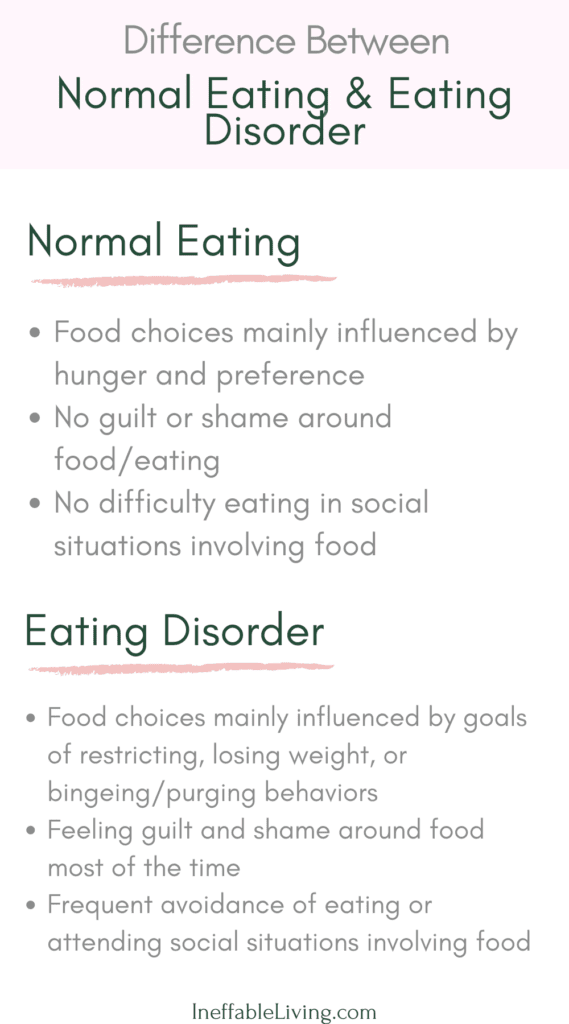
#4. Manage Your Difficult Emotions
An eating disorder doesn’t just affect your partner. It can also affect you and your relationship, triggering in you emotions, such as anger, fear, and hurt.
Be Clear About Your Feelings
Slow down and pay attention to what is going on in your body. Talk it over with a safe person, or write about it in your journal.
Remind Yourself That Your Feelings Are Normal
The way an eating disorder can affect your relationship might leave you feeling like you’re going crazy, swinging from one extreme to the other.
Remind yourself that your difficult emotions are normal.
Remind Yourself That You Don’t Have To Act On Your Emotions
Difficult emotions can be frightening because we risk losing control and acting in ways we might regret later.
Remind yourself that you can still deal with these emotions in healthier ways.
If you find yourself getting angry or frustrated talking about the eating disorder, ask your partner for some time-off to cool down. Distract yourself by doing something else.
Let These Emotions out Appropriately
If you feel hurt, don’t bottle up these feelings. Process them in healthier ways: write in your journal about them, talk with a friend, or sit down with yourself and reflect on what’s going on.
Related: 6 Simple Ways to Manage Difficult Emotions and Control Them
2. Find Empathy
How does your empathy help your loved one?
Understanding where your partner is coming from will move you toward a healthier, more supportive stance.
#1. Understand Your Partner‘s Perception
When the eating disorder takes over, it distorts the person’s perception.
They might believe that their value and worth is determined by their food behaviors and their body size, and that their lovability is about following certain food and exercise rules.
Although they might be aware that they’re falling into the eating disorder trap, their distorted perception seems true, even if they logically know that it’s not.
That’s why arguing the facts with your loved one won’t get you anywhere and can only make things worse.
#2. Respect Your Partner’s Experience
Using empathy, try to understand the way your partner sees things – even though you don’t agree.
Practical Exercise
To deepen your understanding, put yourself in your partner’s shoes.
Use an experience you went through in the past that other people didn’t understand. It may have been an experience of a panic attack, a specific phobia, or a time when you felt upset about something other people didn’t think it was worth being upset about.
In your journal, write about that incident and how not being understood made you feel.
How did you need and want other people to approach you about that incident?
How can you use that experience to show your partner more understanding and support?
#3. Understand the Factors of Eating Disorder
The factors behind your partner’s eating disorder are specific to them, and understanding these should be through an honest conversation or through the help of a professional.
But following are some common factors:
Shame
Whatever their body size or shape is, people with an eating disorder usually harbor a deep sense of shame about it.
This sense of shame is usually connected to a deeper sense of shame about the self as a whole, believing that we are flawed and therefore unworthy of love and belonging.
In an attempt to make themselves “good,” many believe that being thin is their way to becoming worthy – an idea that is strongly reinforced by our culture.
Numbing
Some people would use their eating disorder as a way to manage difficult emotions, such as anger, sadness, and shame.
An eating disorder narrows the emotional pain. It’s hard to feel anything when you’re overwhelmingly hungry or full. Also, thinking about food and calories all the time, makes it hard to think about anything else.
While this might work in the short term, these feelings are being left unaddressed. Over time, they can intensify and come out in unpleasant ways, like outbursts, breakdowns, etc.
Control
Some people who are struggling with anxiety and a strong need to control their lives, or trauma survivors, might use the eating disorder to feel more in control.
Even if they don’t feel in control of anything else in their lives, at least they are in charge of what goes into their body.
Practical Exercise
To deepen your empathy, try to put yourself in your partner’s shoes and think back to a time when you experienced a deep sense of shame, a strong need to numb your difficult emotions or a time you felt out of control.
3. Approach It In Healthier Ways
#1. Establish Good Boundaries
Boundaries define where you end and someone else begins—and vice versa!
Boundaries are meant to protect relationships and prevent feelings of guilt and resentment from building up.
You acknowledge that you’re not responsible for other people’s behavior, feelings, or thoughts and you don’t try to change them or control them.
You also recognize that you’re fully responsible for your own behaviors, feelings, and thoughts and you don’t allow other people to control you.
Someone with loose boundaries might think to themselves, “This person is upset, I must do everything to fix that.”
While someone with healthy boundaries would think, “This person is upset. Is there anything I can do to help him without sacrificing my own sense of wellbeing?”
For example:
- If your partner takes your food, it’s their responsibility to replace it
- If they purge, it’s their responsibility to clean afterward.
- If you’re cooking, you don’t have to go to great lengths to make them a special meal.

#2. Communicate Clearly
Choose The Right Timing
An eating disorder can take a toll on your emotional health and make food conversation extremely anxious.
Make sure you’re as calm as possible when talking about food situations. If you’re getting overwhelmed, take a time off to calm down.
Use I-Statements
You-statement usually puts the other person on the defensive because what comes out next is likely a criticism.
Instead, use I-statements to express how a certain situation makes you feel, or think. That way you’ll make sure that you’re speaking only for yourself.
If you’re talking about something your partner is doing, keep your focus on the behavior rather than the person.
So, instead of saying, “You upset me when you skip dinner,” try saying, “I feel upset when you skip dinner.”
4. Help Your Partner Fight the Eating Disorder
#1. Express Your Confidence
It is important for your partner to believe that they can recover and face their difficult emotions.
It helps if you assure them that you believe in their ability to handle it. A simple “I believe in you” can go a long way.
You can also remind them of the past struggles they faced successfully.
#2. Offering Support – Tangible or Emotional
Tangible support might involve doing tasks that will make your partner’s life easier, such as preparing meals, paying for treatment, offering rides to treatments, etc.
Emotional support is more about being – being available, empathic, encouraging, etc.
#3. Avoiding Triggers
Eating disorders’ triggers can be specific to each person.
These can include, mirrors, scales, compliments, difficult emotions of sadness, anger, anxiety, seeing an extremely thin person, or a large person, being photographed, wearing certain types of clothes, clothes shopping, taking off clothes, fashion magazines, and websites, etc.
Understand your partner’s triggers and try to avoid them. When a trigger is unavoidable, ask your partner how you can support them.
#4. Engaging Your Partner in Nonfood-Related Activities
This will help your partner shift their focus.
If you’re celebrating their birthday, instead of going out to dinner, choose an activity like:
- bowling
- book club
- art classes
- dancing
- hiking
- movies
- theater
- museum trips
- sport game
Get Feedback from Your Partner
No one can tell you how to best support your partner, more than your partner themselves.
Keep open communication and ask your partner if you’re doing all these things right, and what would they wish you’d do.
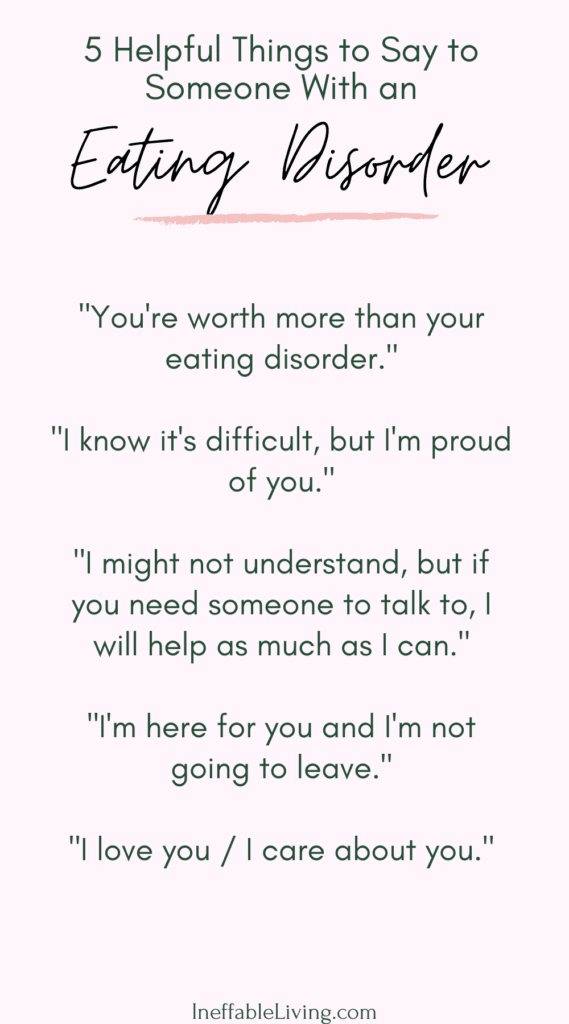
What If Your Partner Denies That They Have A Problem?
While you may not be able to make your loved one see how their food behaviors are problematic, you should let them know how their behavior is affecting you and affecting the relationship.
Use I-statements when expressing your concerns and allow for the possibility that you could be mistaken.
If your partner is refusing treatment, don’t make an ultimatum unless you’re prepared to follow through with the consequences.
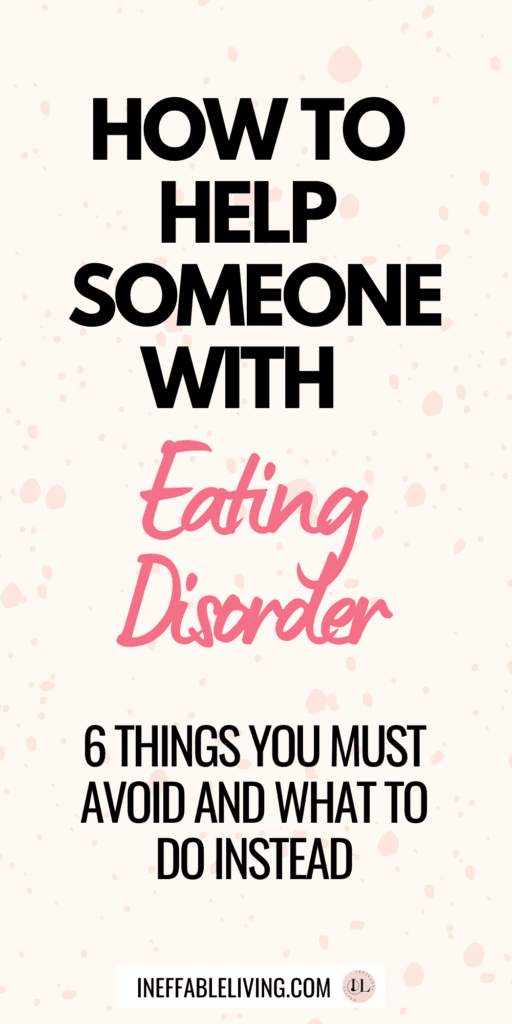
Resources
- Portions of this article were adapted from the book Loving Someone with an Eating Disorder, © 2019 by Dana Harron. All rights reserved.
- Eating disorder – Wikipedia
- Eating Disorders: Types, Causes, Treatment, and Recovery (healthline.com)
- Eating Disorder Signs & Symptoms | Learn | NEDA (nationaleatingdisorders.org)
